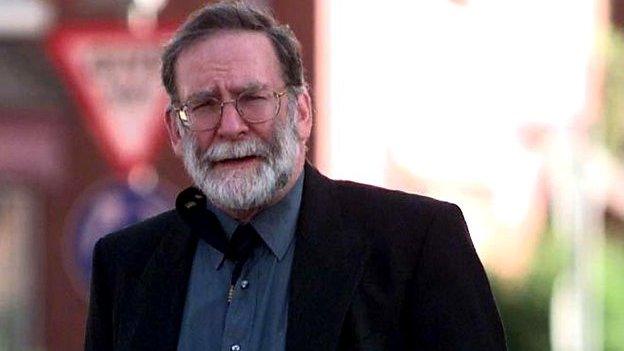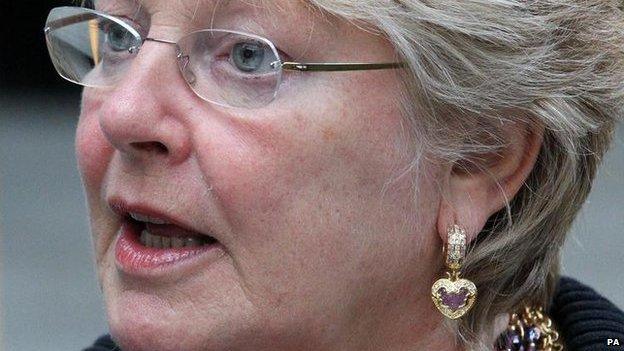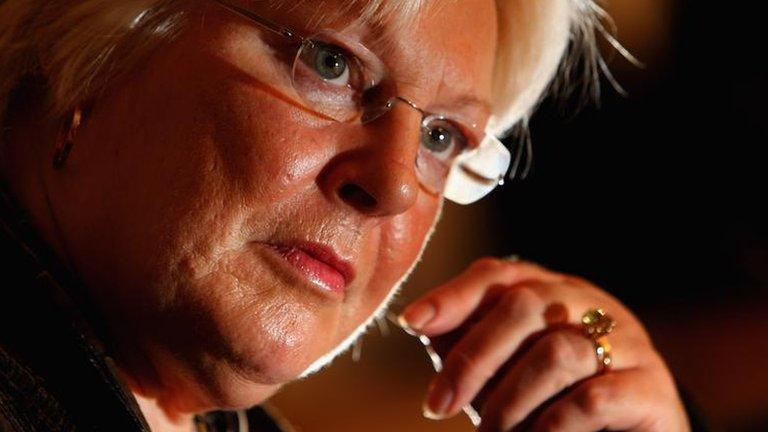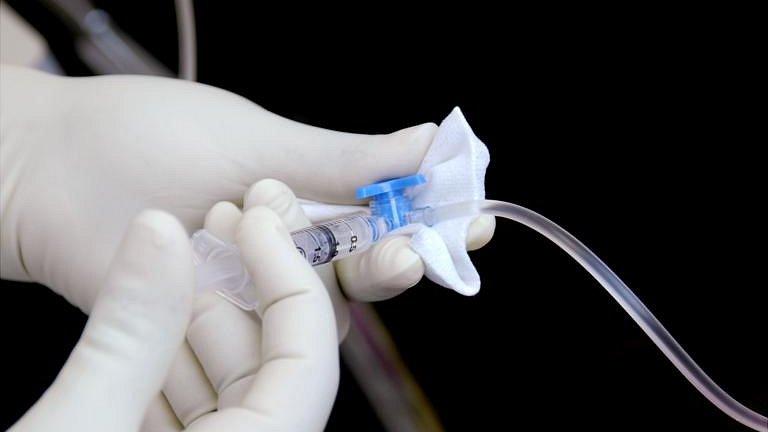Shipman effect: How a serial killer changed medical practice forever
- Published

The motives for Harold Shipman's serial killing remain unclear, 10 years after his death
The medical world was shattered when trusted GP Harold Shipman was exposed as a serial killer, responsible for the deaths of up to 215 patients. Shipman killed himself in 2004 - but the spectre of his case still hangs over doctors. As Scotland's assisted suicide bill is considered, its supporters in the medical community explain how fear has changed the way doctors conduct palliative care.
Most of Shipman's victims were elderly women, in good health for their age, killed by injecting lethal doses of diamorphine (the pharmaceutical name for heroin). As his legacy seeped through the medical community, the topic of doctors helping patients to die - already highly sensitive - became even more uncomfortable. But it wasn't always so.
Dr Iain Kerr, who made headlines after admitting helping patients to die, talks frankly about his experiences of treating people with terminal illnesses.
He had one patient suffering at the end of the trajectory of his illness who asked for an additional dose of pain relief.
Dr Kerr said yes, but explained the risks: that if he gave him the dose at that point, he "may not wake up".
The patient responded that his son was visiting that evening, and asked if Dr Kerr could administer the dose after he'd had a chance to say goodbye.
Dr Kerr agreed, and later that evening he gave the patient the standard dose. He died shortly afterwards.
"This is the sort of behaviour that is not really appropriate nowadays, post-Shipman," he says.
Doctrine of double effect
If a doctor or family member deliberately assists or encourages another person to kill themselves, they have assisted suicide. If they deliberately end another person's life to alleviate their suffering, they have committed euthanasia. Both are crimes under Scots Law.
But the legal system is not entirely black and white.
The "doctrine of double effect" states that a morally sound action with an unintended negative side-effect is permissible.
It is frequently used to explain the way some doctors administer terminally ill patients with pain relief. Doctors are aware that high doses of morphine may hasten the death of these patients - but they give them the drugs anyway, to ease pain.
.jpg)
The principle of double effect is broadly accepted by the courts in medical situations
Professor Sheila McLean, emeritus professor of law and ethics in medicine at the University of Glasgow, explains that although the principle is subject to considerable criticism, "it is broadly accepted by the courts in medical situations".
She says: "If you end up causing death or shortening life, when your intention was alleviate suffering not to cause death then generally this will be a defence."
Nobody understands what motivated Shipman - labelled "Dr Death" by the tabloids - but it is accepted that his intentions were malicious, distinguishing his actions from the double effect doctrine.
But that doesn't stop well-meaning doctors fearing they too will become known as "Dr Death" if one of their patients dies due to pain relief drugs.
'Acceptable practice'
The principle was more accepted in the past than it is now.
"The doctrine of double effect was well established as an acceptable practice," says Dr Kerr.
"There was certainly a more relaxed attitude," he says. "There was more respect for the doctor's autonomy, whether they deserved it or not."
He tells the story of Lord Dawson, doctor to King George V, who - so the story goes - hastened the king's end with a lethal injection, so his death could be reported in The Times newspaper rather than the evening journals, as befitted a monarch.
.jpg)
Both assisted suicide and euthanasia are currently crimes under Scots law
But times change. The Shipman case made people more uncomfortable about the control doctors can have over the end of someone's life. People who had previously placed blind faith in the medical community became newly aware of the sheer power of the doctor, who held the hand of patients as they walked the tightrope between life and death.
By hurting instead of helping, Shipman perverted the doctor's primary objective.
When his actions were first discovered, people struggled to understand him. There is no clear motive for the suspected hundreds of murders by the former "trusted" GP.
A decade has passed since the disgraced doctor hanged himself in his cell. But those left behind are still living with his legacy.
Dr Death
Emeritus Professor of Medical Neurology Charles Warlow is one of the country's leading neurologists and stroke researchers. He is one of a small group of doctors who have publicly backed late MSP Margo MacDonald's Assisted Suicide (Scotland) Bill, external.
The Bill - which would allow assisted suicide in very limited circumstances - has attracted its fair share of controversy.
Dr Warlow explains why few practising doctors are willing to voice their support.
He says: "(They) are nervous about sticking their necks out, being labelled 'Dr Death'. They don't want to be seen by their patients as someone who's going to bump them off.
"Of course, the Margo MacDonald bill is nothing to do with 'bumping people off' - it requires mental capacity and consent, it's not euthanasia but assisted suicide. It's completely different to those ghastly stories of Shipman. But doctors are nervous. Practising doctors are uneasy about coming out about this."
The fear is not only manifested in terms of support - or lack thereof - for the Bill.
Dr Gillian MacDougall, a practising ear, nose and throat surgeon, who backed the Bill, believes the double effect doctrine is used less in palliative care.
She says: "I suspect it goes on a lot less than it used to, because of Shipman.
"I think people now don't feel they can do that, whereas they did before."
Professor Warlow agrees.
He says: "People now look over their shoulders much more than they used to."
'Miserable' from living
In 2011, the General Medical Council (GMC) announced it would publish its first ever guidance on how to deal with complaints against doctors who may have assisted in suicides.
Campaign groups had pointed out the ambiguity about what healthcare professionals are allowed to do when asked for help to die by a patient.
The advice, published last year, instructs doctors on how to react when asked for information about assistance to die.

Margo MacDonald, who suffered from Parkinson's, launched a new assisted suicide bill last year
While the guidelines recognise the "challenges" that doctors face in this area, in 2012 the GMC's chief executive Niall Dickson said that "the main message is that assisting suicide is illegal and doctors should have no part of it".
In April, Margo MacDonald died of Parkinson's, the disease that prompted her to campaign to legalise assisted suicide for the terminally ill. It remains to be seen whether her Bill - her second attempt to change the law - will be passed in Scotland.
In the summary of consultation responses to the Bill, external, fears relating to potential parallels between assisted suicide and the Shipman case were mentioned twice.
If the Bill is passed, it will add Scotland to the short list of countries that allow assisted suicide under certain conditions.
As it stands, the amount doctors can do for patients who are desperate to end their lives is limited.
Dr Kerr tells a story of when he returned to work after being suspended for prescribing sleeping pills to a suicidal woman. An elderly patient who was "miserable" being alive said to him: "well, you can't do anything to help me now".
As for the way doctors are permitted to treat patients who wish to die, Dr Kerr is aware there are no easy answers.
"There are changes in society," he says. "Some for the better and… well, who's to say it's for the better or not."
- Published14 November 2013

- Published10 March 2014

- Published19 July 2010